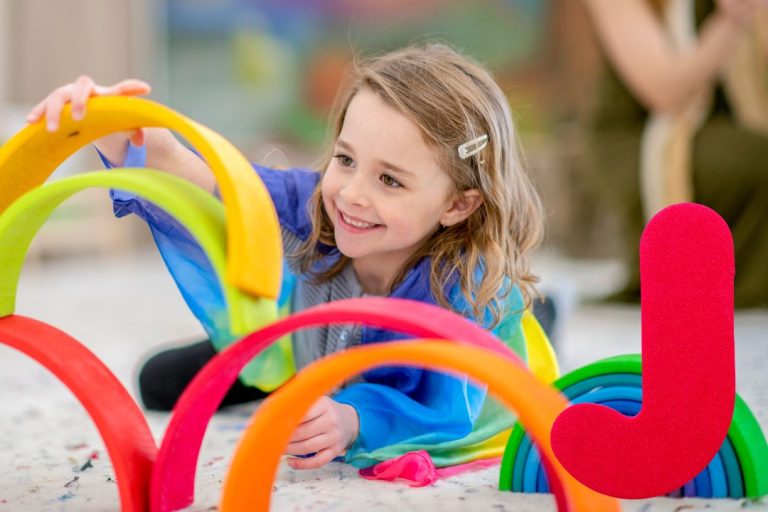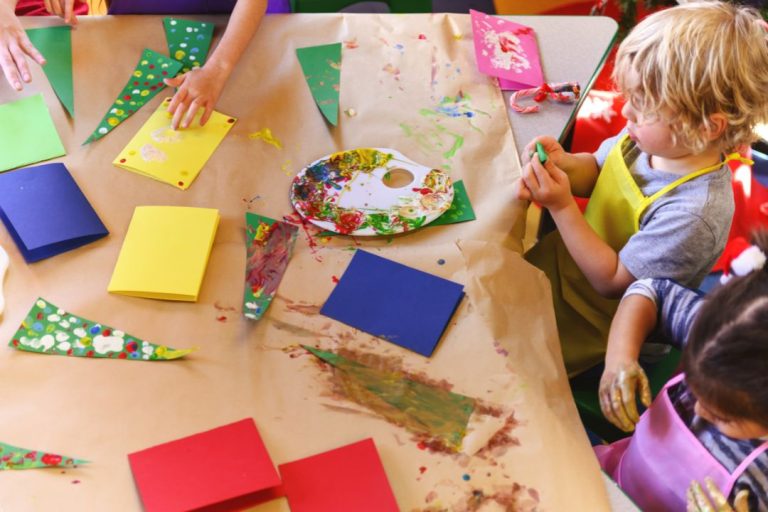The Benefits of Music in Early Childhood Education

The benefits of music in early childhood education include improving cognitive development and enhancing language skills. Music plays a crucial role in nurturing creativity and boosting social and emotional development in young children.
By integrating music into early childhood education, children can enhance their cognitive abilities and develop essential skills for future success. Music also fosters a positive learning environment and encourages children to express themselves creatively. Additionally, exposure to music at a young age can positively impact children’s emotional well-being and help them develop a love for the arts.
As an integral component of early childhood education, music provides numerous benefits that contribute to holistic development and a well-rounded educational experience for young learners.
Harnessing Music’s Power In Early Education
Benefits Of Incorporating Music In Daily Activities
Introducing music into daily activities can greatly enhance a child’s early education experience. By incorporating music, children can develop a strong foundation in various developmental areas, including cognitive, emotional, and social skills.
How Music Can Foster Emotional Intelligence
Music plays a pivotal role in aiding emotional intelligence development in early childhood. Through engaging with music, children learn to identify and express their emotions while also enhancing their ability to comprehend and empathize with the emotions of others.
Musical Activities That Boost Cognitive Development
Engaging in musical activities can significantly boost cognitive development in young children. Through interactive activities such as singing, rhythm exploration, and musical games, children can enhance their memory, attention, and problem-solving skills.
Unveiling Music’s Role In Child Learning
Music plays a fundamental role in early childhood education by fostering numerous cognitive, emotional, and social skills. Understanding the impact of music on child learning can shed light on the significance of integrating it into educational settings for young children. Let’s explore how rhythm and melody contribute to language acquisition, the influence of music on memory and attention, and how music education encourages creativity in young minds.
The Role Of Rhythm And Melody In Language Acquisition
The inherent connection between music and language acquisition has been well-documented. Rhythm and melody in music help children discern patterns, understand sequences, and develop a sense of auditory discrimination. This, in turn, aids in the development of phonological awareness and language comprehension. Through exposure to music, young learners gain an intuitive grasp of the cadence and intonation crucial for effective communication and language acquisition.
Music’s Influence On Memory And Attention In Young Children
Music possesses a remarkable ability to engage and stimulate a child’s memory and attention. Repetitive melodies and rhythms create a structured and predictable auditory environment that enhances cognitive processes, leading to improved memory retention and concentration. Additionally, participating in musical activities such as singing and playing instruments encourages active engagement, enhancing a child’s ability to maintain focus and attention, laying a strong foundation for future learning.
Encouraging Creativity Through Music Education
Music education serves as a powerful medium for fostering creativity and imagination in young children. Through exposure to a variety of musical genres, activities, and instruments, children are encouraged to explore, experiment, and express themselves freely. This creative exploration not only nurtures artistic inclinations but also fosters problem-solving skills, self-expression, and emotional intelligence, contributing to holistic development.
Optimizing Classroom Environments With Melodies
When it comes to early childhood education, creating a conducive learning environment is paramount. The integration of music into the classroom can lead to numerous benefits, stimulating young minds and enhancing the overall educational experience. By optimizing classroom environments with melodies, educators can cultivate a dynamic and engaging atmosphere that promotes learning and development.
Creating A Musical Atmosphere For Better Concentration
Music has the power to transform and uplift the classroom environment, fostering an atmosphere that encourages concentration and engagement. By incorporating melodic backgrounds during quiet activities, such as reading or drawing, educators can create an environment conducive to deeper levels of focus and attention. Additionally, the soothing and repetitive nature of certain melodies can assist in calming restless or agitated children, facilitating a more tranquil atmosphere for enhanced concentration.
Music As A Tool For Classroom Management
Utilizing music as a tool for classroom management can yield remarkable results. Incorporating rhythmic beats during transition periods can aid in grouping children effectively, fostering a sense of routine and structure. Moreover, the strategic use of specific tunes can signal transitions from one activity to another, promoting smooth and efficient flow within the classroom. Rhythmic cues can also serve as signals for expected behaviors, offering a non-verbal approach to reinforce classroom guidelines and expectations.
The Benefits Of Music In Physical Development
Physical development is an essential aspect of early childhood education, and music plays a crucial role in enhancing this development. The rhythm, melody, and movement involved in music contribute significantly to the physical well-being of young children. Through various musical activities, children can improve their motor skills, coordination, and spatial-temporal abilities.
Enhancing Motor Skills Through Musical Movement
- Engaging in musical activities such as dancing, clapping, and playing instruments helps children develop fine and gross motor skills.
- The coordination required to move to the rhythm of music enhances balance, agility, and overall physical dexterity.
- Musical movement also encourages children to explore different ways of using their bodies and enhances their physical confidence.
The Connection Between Music And Spatial-temporal Skills
Research has shown that exposure to music from an early age has a positive impact on the development of spatial-temporal skills, which are essential for cognitive and physical functions. Here are some ways in which music contributes to the development of spatial-temporal skills:
- Rhythmic patterns in music help children internalize and anticipate sequences, which are crucial for fine motor control.
- Engaging in musical activities such as playing instruments and moving to the beat enhances children’s understanding of time and space relationships.
- Listening to music stimulates the brain and improves spatial reasoning abilities, which are beneficial for activities requiring spatial awareness such as sports and dance.
Nurturing A Lifelong Love For Music
Introducing music to children at an early age can have a lasting impact, nurturing a lifelong love for music and providing them with numerous cognitive, emotional, and social benefits. Early exposure to music lays the foundation for a deep appreciation and understanding of different genres and musical concepts, paving the way for continued engagement with music throughout their lives.
Instilling Music Appreciation Early On
Instilling music appreciation early on in a child’s development sets the stage for a lifelong connection with music. Through interactive musical activities, children can develop an understanding of rhythm, melody, and harmony, fostering a deep appreciation for the art form. Exposure to diverse musical styles and cultures at a young age expands their musical repertoire and enhances their ability to interpret and connect with music on a deeper level.
How Early Music Education Can Lead To Continued Musical Involvement
Early music education can lead to continued musical involvement by laying the groundwork for a strong musical foundation. When children are exposed to music at a young age, whether through informal play or structured learning environments, they are more likely to develop a passion for music that endures into adulthood. This early exposure enhances their musical abilities and encourages active participation in musical activities, such as learning to play an instrument, singing, or engaging in community music programs.
Parents’ Role In Fostering Musical Growth Outside The Classroom
Parents play a crucial role in fostering their child’s musical growth outside the classroom. Encouraging music listening, providing access to musical instruments, and attending live performances can further enhance a child’s musical journey. By creating a supportive environment where music is celebrated, parents can ensure that the benefits of early music education continue to flourish well beyond the early childhood years.

Credit: www.gryphonhouse.com
Frequently Asked Questions For The Benefits Of Music In Early Childhood Education
What Are The Cognitive Benefits Of Music For Young Children?
Research shows that early exposure to music enhances cognitive development in areas such as language, reading, and math skills. It also improves memory, attention, and problem-solving abilities, providing a strong foundation for learning.
How Does Music Contribute To Social And Emotional Development In Early Childhood?
Music helps children express emotions, develop empathy, and build social connections. Through music, they learn to cooperate, communicate, and regulate their emotions, fostering a positive and supportive environment for their overall social and emotional development.
Can Music Enhance Creativity And Imagination In Young Children?
Absolutely. Engaging with music stimulates a child’s creativity and imagination, encouraging them to explore, experiment, and express themselves in unique ways. It nurtures their ability to think outside the box and develop their own ideas.
Is Music Education Beneficial For Overall Academic Performance In Young Children?
Yes, studies have shown that music education positively impacts overall academic performance. It boosts brain functions related to language and reasoning, leading to improved performance in a wide range of subjects. Music education also enhances critical thinking and problem-solving skills.
Conclusion
Incorporating music in early childhood education can greatly benefit children’s cognitive, social, and emotional development. The positive impact of music on memory, language skills, and academic performance makes it an essential component of a well-rounded education. By providing children with musical experiences, we can nurture their creativity and enhance their overall learning experience.
As educators and parents, we should recognize the invaluable role that music plays in shaping young minds and continue to prioritize its integration into early childhood curriculum.

Emily specializes in integrating arts into early childhood education. She believes in fostering creativity and imagination through music, art, and drama activities.







3 Comments